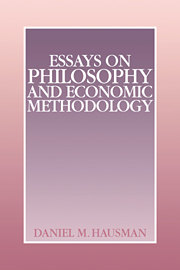Book contents
- Frontmatter
- Contents
- Introduction: What is philosophy of economics?
- PART I METHODOLOGY AND THEORY APPRAISAL
- PART II CAUSALITY IN ECONOMICS
- PART III CASES AND PUZZLES
- PART IV POSTSCRIPTS
- 16 How to do philosophy of economics
- 17 Reflections on philosophy and economic methodology
- Bibliography of relevant writings by Daniel M. Hausman
- Bibliography of works by other authors
- Index
16 - How to do philosophy of economics
Published online by Cambridge University Press: 05 June 2012
- Frontmatter
- Contents
- Introduction: What is philosophy of economics?
- PART I METHODOLOGY AND THEORY APPRAISAL
- PART II CAUSALITY IN ECONOMICS
- PART III CASES AND PUZZLES
- PART IV POSTSCRIPTS
- 16 How to do philosophy of economics
- 17 Reflections on philosophy and economic methodology
- Bibliography of relevant writings by Daniel M. Hausman
- Bibliography of works by other authors
- Index
Summary
Although philosophers of science have always been interested in the actual work of scientists, there has been a strong turn in the last generation away from prescribing how science ought ideally to proceed and toward studying more carefully how science has proceeded. In part this turn has been a reaction to previous work in philosophy of science, which to many seemed misguided and largely irrelevant to the sciences. In part this change reflects a general skepticism about the possibility of doing traditional foundationalist epistemology. Such skepticism is itself a reaction to the failure of the foundationalist program of the logical empiricists. The contemporary turn toward careful empirical study of the sciences constitutes a new program for the philosophy of science, which I shall call “empirical philosophy of science” or “the empirical approach to the philosophy of science.”
EPIRICAL PHILOSOPHY OF SCIENCE
The credo of the empirical approach may be stated trenchantly and simplistically as follows:
The philosophy of science is itself an empirical science.
All conclusions about the scientific enterprise that the philosopher of science draws are, or should be, scientific conclusions and must be defended in the same way or ways that the results of the sciences are defended. When the philosopher of science makes pronouncements about the goals of science or the basis or bases upon which scientists accept various theories or about any other feature of science, we should regard these pronouncements as scientific claims and assess them as we would assess the various assertions the sciences make.
- Type
- Chapter
- Information
- Essays on Philosophy and Economic Methodology , pp. 221 - 229Publisher: Cambridge University PressPrint publication year: 1992



